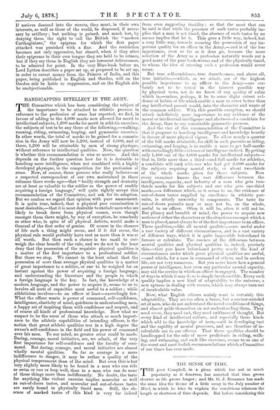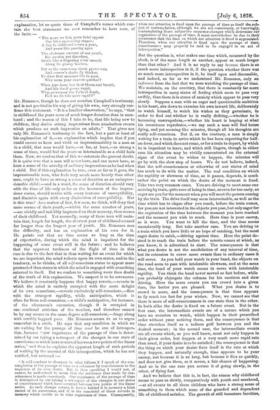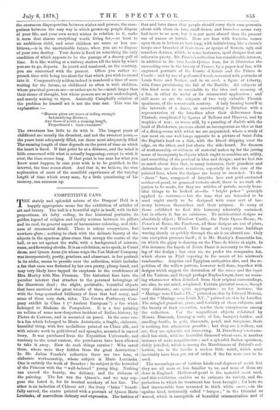THE SENSE OF TINIE.
THE poet Campbell, in a piece which has not as much popularity as it deserves, has asserted that time grows shorter as life grows longer ; and Mr. G. J. Romance has made the same idea the theme of a little essay in the July number of Mind, in which he tries to explain the conditions whereon the length or shortness of time depends. But before considering this
explanation, let us quote those of Campbell's verses which con- tain the best statement we ever remember to have seen, of the facts :— " The more we live, more brief appear Our life's succeeding stages ; A day to childhood seems a year, And years like passing ages.
The gladsome current of our youth, Ere passion yet disorders, Steals like a lingering river smooth Along its grassy borders.
But as the care-worn cheek grows wan, And sorrow's shafts fly thicker, Ye stars that measure life to man, Why seem your courses quicker?
When joys have lost their bloom and breath, And life itself grows vapid, Why, as we near the Falls of death, Feel we its tide more rapid ?"
Romanes, though he does not mention Campbell's testimony, and is. not poetical in his way of giving his own, very strongly con- firms this statement. "It is a familiar observation," he says, "that in childhood the years seem of much longer duration than in man- hood ; and the reason of this I take to be, that life being new to children, they derive strong impressions from numberless events which produce no such impression on adults." That gives not only Mr. Romanes's testimony to the fact, but a part at least of his oxplanation of it,—an explanation which implies that if you could ensure as keen and vivid an impressionability in a man as in a child, that man would have,—so far, at least,—as strong a sense of time, would feel the years as interminable as a child feels them. Now, we confess that of this we entertain the gravest doubt. It is quite true that a man will never have, and can never have, as keen a sense of the novelty of ordinary impressions as he had when a child. But if this explanation be true, even so far as it goes, the impressionable man, who feels very much more keenly than other men, ought to have as strong a sense of duration as an unimpres- sionable child :—and in a word, the sense of duration should vary with the time of life only so far as the keenness of the impres- sions varies, should revive with every increase of susceptibility, and diminish again with every diminution of susceptibility. But is this true? As a matter of fact, few men, we think, will deny that more scenes of their youth,—within the same number of years, —are vividly and indelibly impressed on their memory, than scenes of their childhood. Yet assuredly, many of these men will main- tain that, length for length, the shortest year of childhood seemed far longer than the longest year of youth. Mr. Romanes sees the difficulty, and has an explanation of his own for it. He points out that no time seems so long as the time of expectation, during which the mind is impatient for the happening of some event still in the future ; and he believes that the apparent tardiness of the flight of time in this case is due to the fact that in thus waiting for an event for which we are impatient, the mind reflects upon its own states, and to the tendency, as he thinks, of all self-conscious states to appear more protracted than states in which the mind is engaged with something external to itself. But we confess to something more than doubt of the truth of this explanation. We suspect it to be erroneous. We believe it constantly happens that happy reverie,—reverie in which the mind is entirely occupied with the mere delight of its own sensations,—reverie exclusively self-conscious,—flies with the strangest rapidity, while anticipation, which is often far from self-conscious,—a child's anticipation, for instance, of the afternoon's excursion, though it is occupied in one continual criticism of the weather, and therefore cannot be by any means to the same degree self-conscious,—drags along with terribly laggard pace. Mr. Romanes seems to us to argue somewhat in a circle. He says that any condition in which we are waiting for the passage of time must be one of introspec- tion, because "our cognisance of the passage of time is deter- mined by our taking a retrospect of the changes in our state of consciousness which have occurred between two-points of the linear series," and then he explains the apparent length of such periods of waiting by the amount of this introspection, which he has not verified, but assumed :— "It will conduce to clearness in what follows if I speak of the con- templation of the passage of time as a reference by consciousness to the sequence of its own states. But in thus speaking I would not, of course, be understood to mean that tho reference thus made by con- SC1011813098 is made consciously. Our cognisance of the passage of time is determined by our taking a retrospect of the changes in our states of consciousness which have occurred between two points of the linear series. As each change occurs, it leaves behind it in memory a faint record of its occurrence, and it is the sum-total of these records in memory which enable us to take cognisance of time. Consequently, when our attention is fixed upon the passage of time as itself the /Jab- pet of contemplation, although we are not consciously, or knowingly, contemplating those subjective sequence-changes which determine our cognisance of the passage of time, it must nevertheless be due to their occurrence that the time on which our attention is fixed is appreciated. Therefore, when our attention is fixed upon the passage of time, consciousness may properly be said to be engaged in an apt of introspection."
But the question is, what makes one time which, measured by the clock, is of the same length as another, appear so mugh longer than that other ? And it is no reply to say because there is so much more introspection in it, if the question whether there was so much more introspection in it, be itself open and discussible, and indeed, so far as we understand Mr. Romanes, only an inference from the fact that we were watching the passage of time. We maintain, on the contrary, that there is constantly far.more introspection in many states of feeling which seem to pass very swiftly, than there is in states of anxiety which appear to pass very slowly. Suppose a man with an eager and questionable ambition in his heart, sits down to examine his own inward life, deliberataly to watch himself, to watch his wishes as they germinate, in order to find out whither he is really drifting,—whether he is becoming unscrupulous,—whether his heart is leaping at what his conscience reprobates,—we say such a man will find hours flying, and yet seeming like minutes, though all his thoughts are really self-conscious. But if, on the contrary, a man is simply waiting for a train to arrive which he has been expecting for half- an-hour, and which does not tome, or for a train to depart, by which he is impatient to leave, and which still lingers, though in either case his attention may be vividly concentrated on the external signs of the event he wishes to happen, the minutes will go by with the slow step of hours. We do not believe, indeed, that the self-consciousness or otherwise of our states of mind has much to do with the matter. The real condition on which the rapidity or slowness of time, as it passes, depends, is much rather the point on which the desire of the moment is fused. Take two very common cases. You are driving to meet some one arriving by train, quite sure of being in time, or even far too early, so eager are you for the moment when you will meet the person coming by the train. The drive itself may seem interminable, as well as the time which has to elapse after you reach, before the train comes, for you are not interested in the objects you pass, but only eager for the expiration of the time between the moment you have reached and the moment you wish to reach. Here time is your enemy, as it were. You want to kill the time, and the time seems unendurably long. But take another case. You are driving to a train which you have little or no hope of catching, but the most eager desire to catch,—driving against time. Here the point de- sired is to reach the train before the minute comes at which, as you know, it is advertised to start. The consequence is that what you desire is not the annihilation of any interval of time, but its extension to cover more events than in ordinary cases it will cover. As you hold your watch in your hand, the objects on the road seem to pass with intolerable slowness, and at the same time, the hand of your watch seems to move with intolerable rapidity. You think the hand never moved so fast before, while you probably objurgate the cabman for his cautious and slow driving. Here the more events you can crowd into a given time, the better you are pleased. What you desire is to crowd in more, and the consequence is that time appears to fly much too fast for your wishes. Now, we cannot see that there is more of self-consciousness in one state than in the other. In both alike the desire is fixed on a future event. But in the first case, the intermediate events are of a nature which you have no occasion to watch, which happen in their prescribed order without your noticing them, and the consequence is that time stretches itself as a tedious gulf between you and the desired moment ; in the second case, the intermediate events are all events which, as you well know, must not only happen in their given order, but happen at a very much more rapid rate than usual, if your desire is to be satisfied ; the consequence is that the thing on which your desire fixes itself is the rate at which they happen, and naturally enough, time appears to be your enemy, not because it is so long, but because it flies so quickly, and does not give them, as it seems, a fair chance of happening. And so in the one case you accuse it of going slowly, in the other, of flying fast.
And we believe that this is, in fact, the reason why childhood seems to pass so slowly, comparatively with youth and manhood, —at all events to all those children who have a strong sense of something in them which none of the guarded and dependent life of childhood satisfies. The growth of still immature faculties, the enormous disproportion between wishes and powers, the com- parison between the easy way in which grown-up people dispose of your life, and your own secret wishes in relation to it, make it seem that almost everything worth living for,—at least to an ambitious child, and most children are more or less am- bitions,—is in the unattainable future, when you are to dispose of your own destiny. Your desire is fixed on something the only condition of which appears to be the passage of a dreary gulf of time. It is like waiting at a railway station till the train by which you are to go, departs. In youth and manhood, on the contrary, you are concerned with the present. Often you rather re- proach time with being too short for that which you wish to crowd into it. Comparatively seldom indeed is manhood a time of mere waiting for the future, as childhood so often is with children, whose practical powers are—or rather are to be—much larger than their stores of thought, but whose powers are as yet undeveloped, and merely waiting to ripen. Assuredly Campbell's solution of the problem he himself set is not the true one. This was his explanation :-
"Heaven gives our years of failing strength Indemnifying fleetness,
And those of youth a seeming length, Proportioned t their sweetness."
The sweetness has little to do with it. The longest years of childhood are usually the dreariest, and not the sweetest years,— the years least adequately filled, not those most adequately filled. The seeming length of time depends on the point of time on which the heart is fixed. If that point be at a distance, and the mind is little concerned with what is actually happening, except to wish it over, the time seems long. If that point is too near for what you know must happen, in case your wish is to be gratified, in the interval, the time seems short. And that is, we believe, the true explanation of most of the manifold experiences of the varying length of time which every man, by a little questioning of his memory, can summon up.




































 Previous page
Previous page